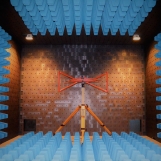Sound, Voice & Music 2019
Full Name: Leah Broad
Annual Conference Theme (if applicable): Listening Across
What were the main points that emerged from your WG this year?
Our theme for this year was ‘listening across’, with our call for participation asking for papers focused on listening intersectionally, across disciplinary boundaries, across temporal and spatial boundaries, and across theory and practice.
What was discussed at your business meeting?
The main point raised in the business meeting was that attendees had found the post-paper discussions particularly useful, and would like to find a way to expand these in next year’s conference. Suggestions included having optional discussion groups in coffee breaks, pre-circulating some papers before the conference, or an idea board to spark discussions among smaller interested groups.
Multiple suggestions were made for our interim event. Those who were present at the meeting observed that one of the key themes to come out of the conference was the multisensoriality of sound, and that this might be a fruitful topic for an interim event or for next year’s conference. Other suggestions included sound and technologies, voice and intersectional identity, and sonic immateriality.
Because of the interdisciplinary nature of all the papers presented, it was suggested that next year’s conference should feature a joint panel in collaboration with another TaPRA working group, to encourage as much interdisciplinary discussion as possible. We also discussed the possibility of inviting practitioners who are not academics to speak as part of next year’s conference.
Types of contributions:
Papers & workshops
Number of formal contributors (those listed in book of abstracts) 21
Approx. overall number of delegates who attended your WG Sessions Around 25 for most panels, and 29 for open panel.
Composition of WG (PG, ECR, etc.)
Estimated 3 PGs, 6 ECRs, rest at later stages of their careers
Did you have any non-UK participants? Yes
If your WG hosted an Open Panel, do you have any feedback?
We haven’t had formal feedback from the open panel, but it was a great opportunity for cross-disciplinary dialogue since colleagues from other WGs could attend, and also for discussion between colleagues at all career stages. However there were issues with programming the PG/ECR panel straight before the session on a different part of the campus, which meant that WG members and presenters had problems getting to the start of the open panel on time.
Any additional points or feedback not covered above?
Having a code of conduct for the Q&A sessions was greatly appreciated, as was the inclusion of pronoun stickers and introvert room. It helped to keep the conference and discussions positive, inclusive, and supportive.

